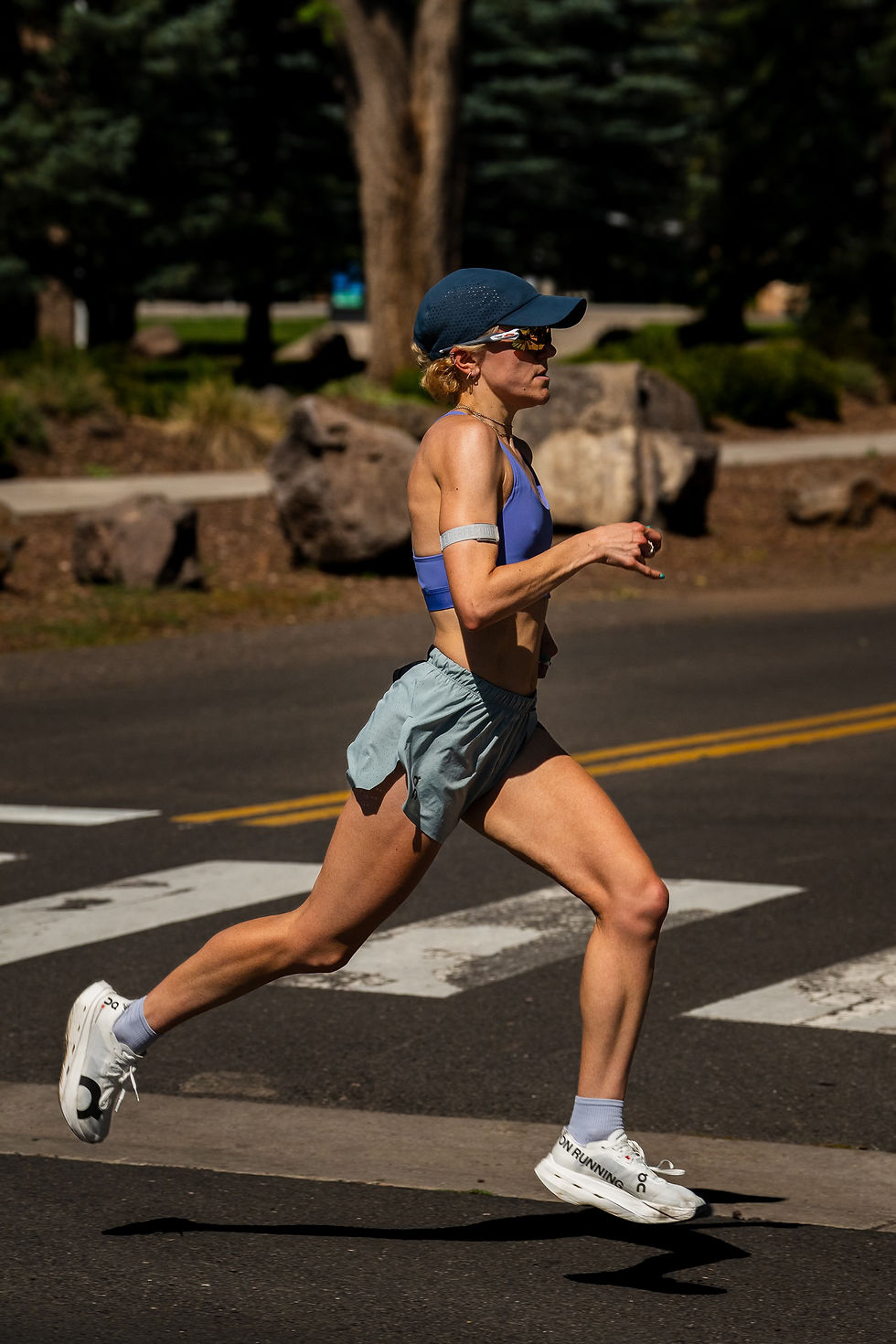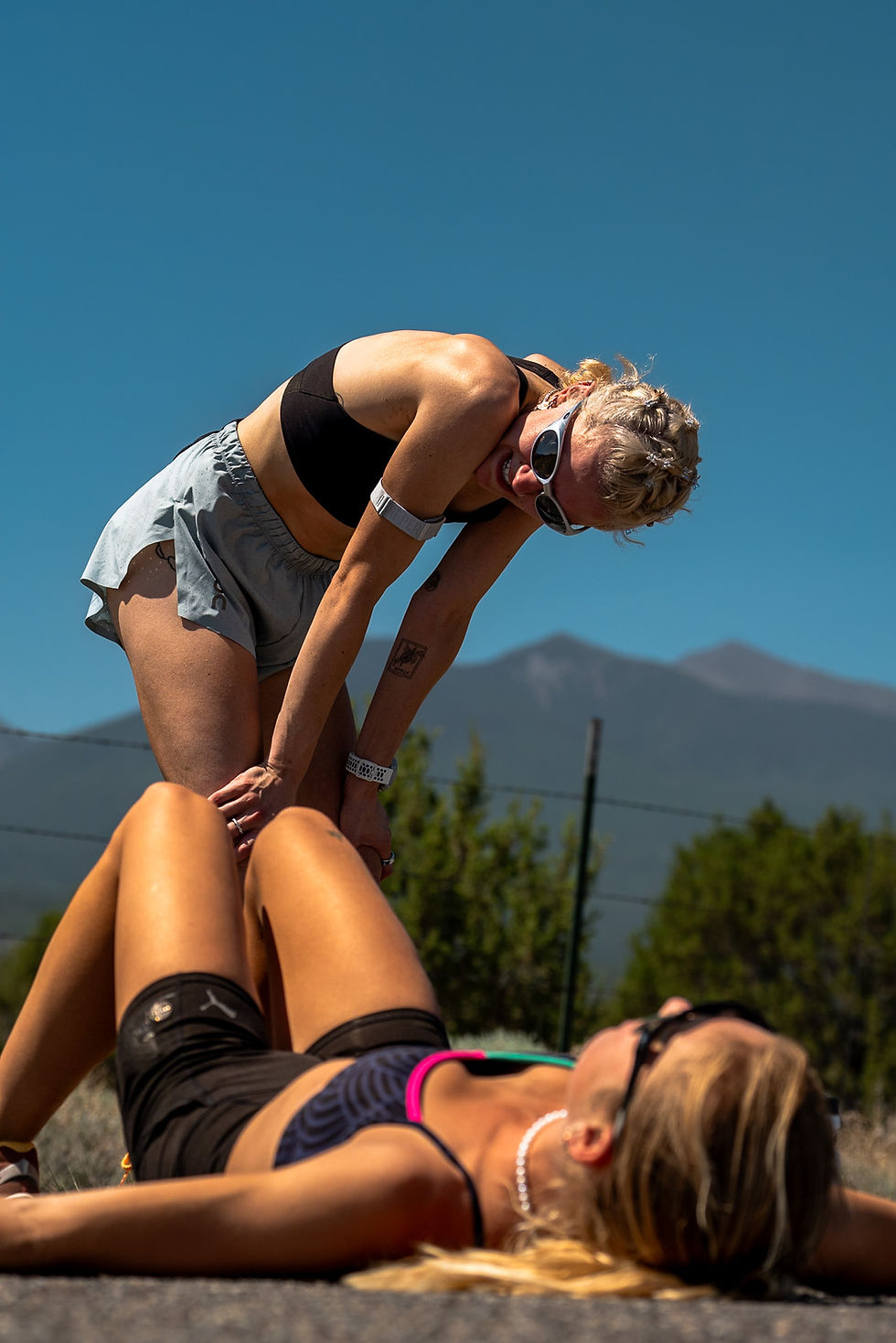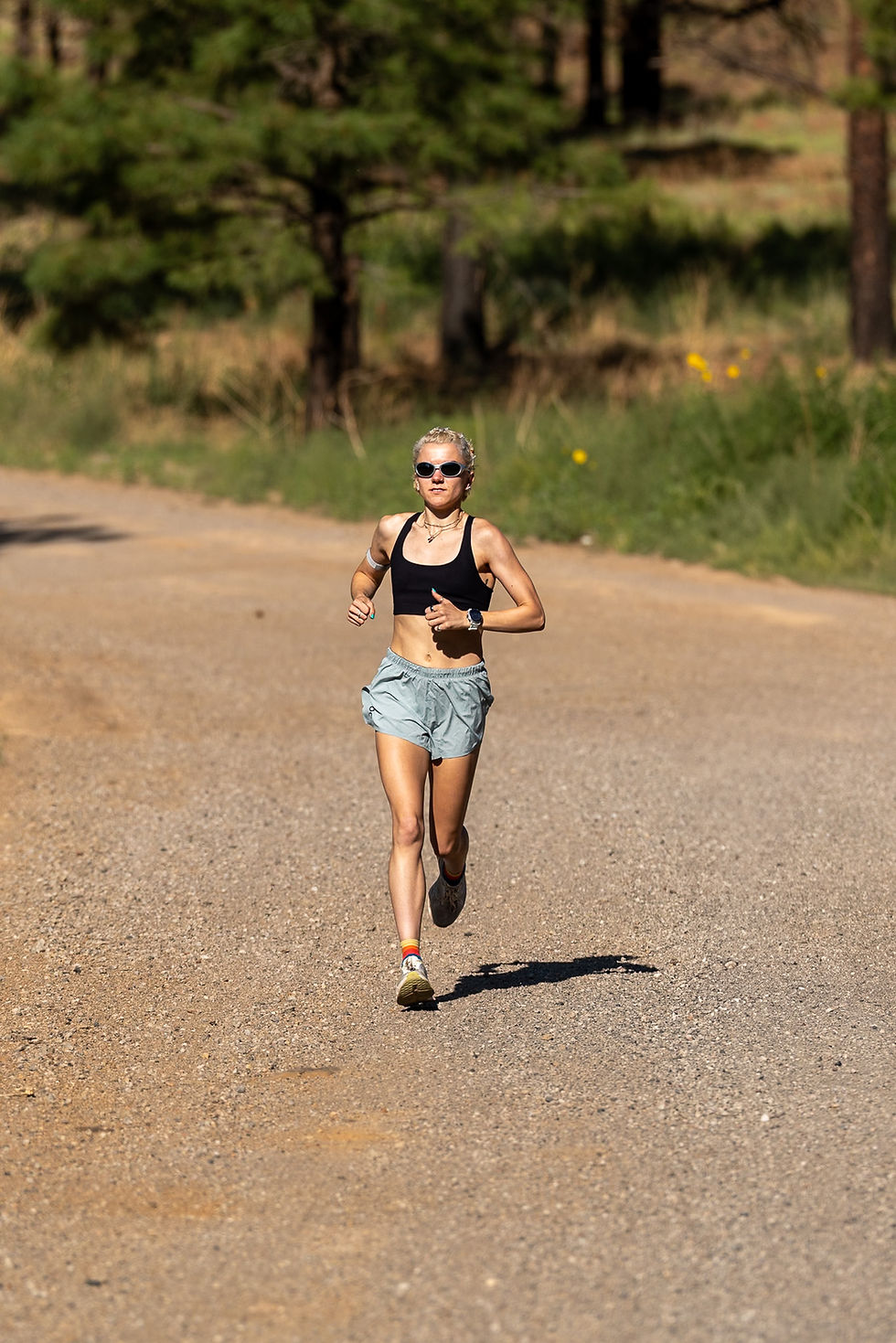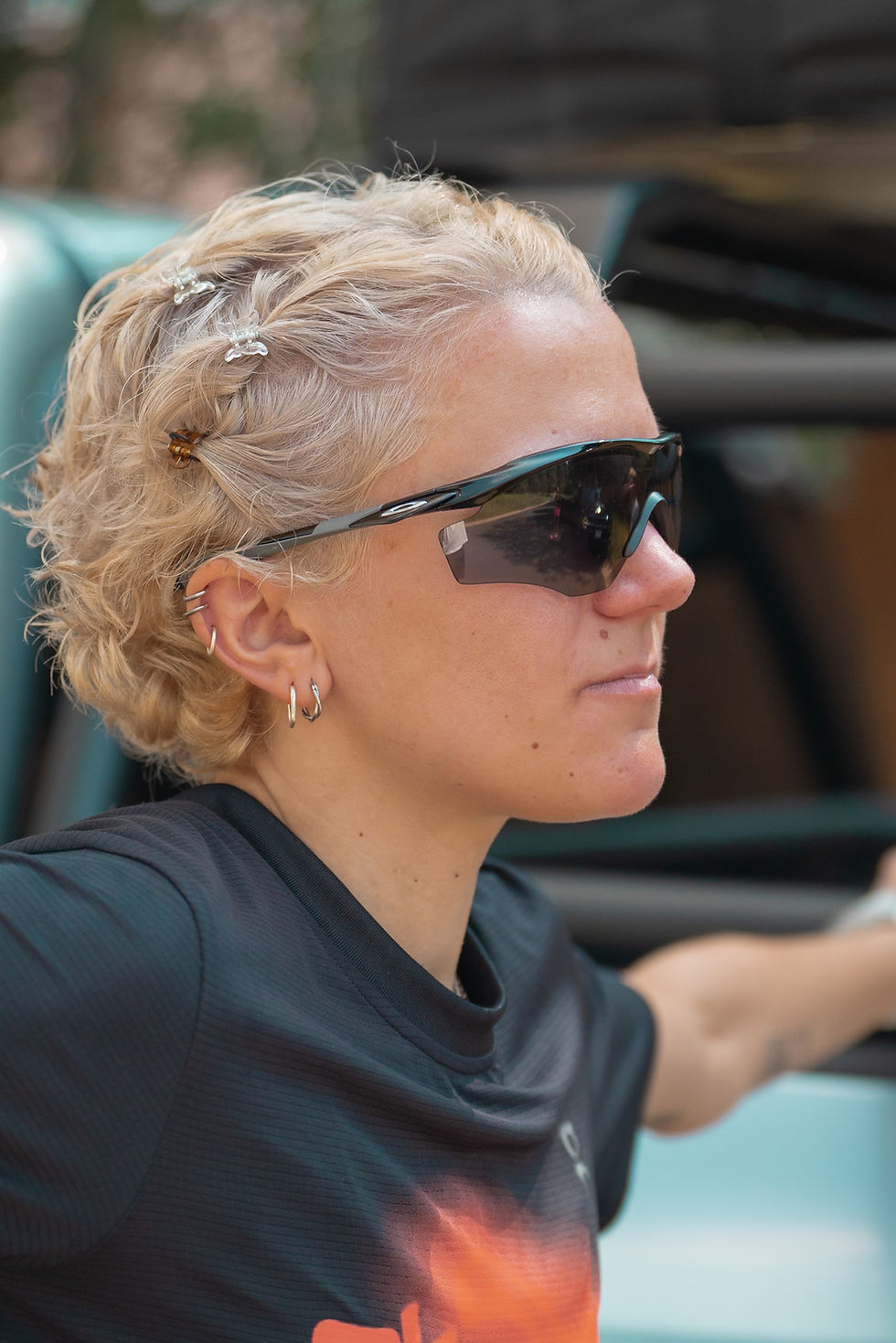Fresh from a stellar performance and 2:25 personal best at Berlin Marathon, international athlete, Phily Bowden, shares her thoughts on being competitive, proving limits wrong, and the importance of honesty.

Congrats on Berlin, how does it feel now you’ve had some time for it all to sink in?
It felt really surreal at first and whilst I'm still soaking it up and feeling very proud, the overwhelming feeling is one of motivation. I'm super motivated to get back into training, get fit again and be able to build on this for the next marathon. I think it's really elevated my perception of what's possible, knowing this wasn't the 'perfect' block (and that probably doesn't exist) and how much we can improve and build on the work that went into this. It's exciting to think what could be possible over the next few years.
What do you think were the biggest learnings from previous attempts that you put into action this time round?
Every marathon is so different and the lessons you gain from running it are always invaluable in my opinion. The last time around in Houston, although a 2 second PB was one of the hardest races I've run, I got to 10 miles on pace for 2:25:52, running a pretty nasty positive split and finishing in 2:29:14. That race really knocked my confidence, which has been a tough process to work through in training for this build, but it also taught me to start out more conservative this time around, and that you can still leave the door open for a fantastic result to be taken care of in the second half of the race. The previous marathon in Copenhagen was a real dream of a day, a negative split and a 5 minute PB to run 2:29:16. One of the coolest learnings from that race was how much energy I gained from an atmosphere and a loud crowd. It was the first race that I feel I really let that energy in, and not only did I appreciate the boost of the noise and the crowds but in the latter stages I found myself giving back and interacting with it to get an even bigger energy return; just a quick smile or a waft of my arm to encourage the crowds to be louder gave me such a great feeling, and I definitely took that into Berlin in the closing stages. My first marathon taught me probably the most constant lesson I'll take into every marathon race: that you can only learn so much from training, and the biggest lessons come from doing the race itself - whether it goes well or not. I'd practised my fuelling religiously every long run during that first block for Seville, but only getting up to 35km in training, I didn't know what my stomach would do on race day after that point. It turns out for me, 200mg of caffeine at the 30km mark meant a very tough last 10km with feelings of wanting to vomit... and then eventually doing so with 600m to go pretty spectacularly. I don't mess with caffeine anymore and my stomach thanks me for it.

"you can only learn so much from training, and the biggest lessons come from doing the race itself"
As an athlete, where does your head go after a big win… are you already thinking about bettering it and the next challenge? Must be a lot of pressure there!
Yep, pretty predictably I'm already eyeing up my next marathon! Originally I'd planned to wait until the autumn, do some shorter road races and a summer track season first, but I'm chomping at the bit for another marathon so it's likely to be in the spring now. Pressure, only really comes from what I put on myself. As soon as you've run X time that's the target to beat next time around and I'm very competitive but I find it really exciting to challenge myself so whilst I'm buzzing to say "I'm a 2:25 runner now" I'm super motivated by what that time may be in the future. I'm also pretty big on true rest and recovery. Running another marathon in the spring still gives me that window to truly decompress mentally and give my body the recovery it needs before building back up which I think is super important for longevity.
Congrats on On, that’s huge. How did that come about?
I'm super excited to be part of the On family, someone from On reached out to me in the spring after seeing my YouTube video about not being a pro anymore, and wanted to explore working with me. I'm both an On pro runner and a partner, so I get to represent them on the World's biggest stages as an athlete and through the content I create too. It feels pretty cool to have a brand back me for what I bring as both an athlete and a creator.

You’ve spoken about the team behind an athlete. Who is in your team? What does your support crew really look like?
It's a small village! There are people who have helped and have been involved who aren't on this list otherwise I'd be writing a book. The core team looks like this:
Coach Jon Green - the man behind the plan; holding a stopwatch and riding the bike at my Flagstaff workouts, a close friend of mine and the person talking me down from my biggest maranoia worries.
Partner in life Daniel - understudy coach at home in the UK; riding the bike, blocking the wind; business partner for everything we do creatively - filming, editing, storytelling; and being there for me in the highest highs and lowest lows.
Sports Psychologist Leah McAslan - I've been working with Leah for 2 years now and the growth I've made as an athlete over that time has been really helped by the sessions we've had. In a marathon block I aim to have a session every 2-3 weeks and we are guided by where I'm at in training mentally and physically, talking through things like mindset, decision making, wellbeing, mental race strategy, strategies for coping with tough days and anxieties. I think training and investing in your mindset is just as important as the physical training.
Training partners at home and away - in Flagstaff I have my Verde Track Club teammates - athletes also coached by Jon and others who hop in from time to time to share the load of hard workouts and runs. At home in Manchester I'm often solo but try to have company as often as I can. I'll meet Ciara Mageean for lots of my easy runs and have shared a good few sessions with Sally Ratcliffe.
Physiotherapist Chris Bramah - the magician who can diagnose and fix any issue I have (so far). Chris is fantastic at his job and working with the same physio over time means he knows my body really well now too so the treatment and rehab he gives me is always so spot on.
You’ve been on quite the journey over the last few years. A lot of athletes we speak to really struggle to balance paid work and training. How do you make it work?
I feel that struggle - it's always a balancing act and it's hard to get it right all the time. Over the last few years I've focused on moulding the paid work I do around a life that prioritises training. I went from being a civil servant, working 9-5, at home a few days, in the office a few days, to working most days of the week but in a very flexible way. My coaching business is totally flexible. I coach remotely so I write training plans during my downtime from training. On the social media front, Daniel and I build our schedule around my racing and training schedule and everything we do always aims to be in line with and compliment my training, careful to not say yes to things that will take energy away from that, which often means saying no to some exciting opportunities. We have a great management team now at Sixteenth who take care of all our brand deals and inbounds which really helps ease the load on admin and decide what we focus on.
"the feeling that drives me every day is the one I get when I prove that limit wrong, surpassing my own expectations and surprising myself - that's a pretty awesome high."
What is your driving force? Your why?
Honestly, I always come back to the fact that I love running - I've always been competitive and finding something I'm good at, know how to get better at, and thoroughly love competing in is a constant for me. If I dig deeper and ask why do I love it, I think that competitive nature expands to being competitive with myself, it's almost a game - how far can I take this? How fast can I get? It's easy to set limits on yourself whether consciously or not, and the feeling that drives me every day is the one I get when I prove that limit wrong, surpassing my own expectations and surprising myself - that's a pretty awesome high.
Do you feel a responsibility to those who look up to you?
Definitely. I want to be the role model I would have benefited from as a young athlete and that comes with responsibility and pressure. Being an inspiration is one thing and of course that's really cool, but I also want to be an example of how to treat yourself with kindness and showcasing sustainable methods around how I train. I don't know if I do this perfectly but remaining honest throughout everything I share and thinking carefully about how a young impressionable mind sees the world are the things I focus on most in that regard.
"Being an inspiration is one thing and of course that's really cool, but I also want to be an example of how to treat yourself with kindness and showcasing sustainable methods around how I train."
Are there any social issues you feel really strongly about – in and out of sports?
I'm really passionate about Women's Sport and any and all issues around that, from gender gaps in participation, pay, media coverage, bias in reporting, research and injury care. I'd like to see a day when we refer to and cover simply 'Sport' rather than Sport and Women's Sport, but there's a long way to go on the issues mentioned and many more to get to that point. Recently I've gotten really interested in educating myself on the menstrual cycle and how this impacts training but also just general life factors. It's genuinely fascinating and I'm sure I'm not the only 29 year old learning things I wish I'd been taught about how my body and hormonal changes can impact and interact with literally every aspect of my life when I was 16.

What do you feel you stand for?
There's a lot I care about and I find it easy to feel overwhelmed, think really big, want to change the world and feel I can't make a difference. What I can do is be as authentic as possible, stay true to my core values, one of which is that authenticity and honesty, and encourage that in others. I make a point not to take myself too seriously in life and in the content I put out, whilst also being super committed to what's important to me and training in line with my goals.
What needs to change in running?
I think a lot of sports need change in how they're structured financially and running or track and field is no exception. However, I don't think I have all the answers for how to change that for the better. I love this sport and also think a lot of it should stay the same - it's so simple and we've seen a boom in people taking up running for that reason over the last few years. It's so accessible and so sociable for an individual sport. One thing I'd love to see is elite running being more accessible to fans and to build that constant fan-base, rather than the 4-year / 2-week Olympic fan base. I think that requires huge change at the organisational level in how competitions are structured, modernisation of some kind to make track and field a faster pace event for today's attention span, and commercial backing - a lot to do but not impossible, and glimmers of hope can be seen with the Grand Slam Track League and Athlos meets entering the space this year.
All images courtesy of Daniel Leadbitter @daniel_moves_

I love Phily's philosophy and her approach to running and in the wider world. I've recently started following her and I find her so inspirational. 😍🤗 Thanks for this interview, it's always good to learn more about the people I follow online xo